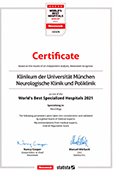Alzheimer's disease is one of the most common causes of dementia in the elderly. Currently, 24 million people in the world suffer from this pathology. It is expected that there will be four times as many such patients by 2050 due to the aging of the population. The possibilities of modern medicine in the treatment of Alzheimer's disease are limited, but many innovative drugs are in the final phase of clinical trials. You can undergo your treatment abroad and take advantage of all the possibilities of modern medicine in the fight against neurodegenerative brain diseases. On the Booking Health website, you can find out the cost of treatment and choose a medical care program for your preferred dates.
Content
- Drug treatment of Alzheimer's disease
- Non-drug treatment of Alzheimer's disease
- New directions in the treatment of Alzheimer's disease
- Where to undergo your treatment of Alzheimer's disease
Drug treatment of Alzheimer's disease
The disease is widespread and often causes disability, but there are currently few effective treatment methods for this condition. Only two groups of drugs for the treatment of Alzheimer's disease have been approved in developed countries. These are cholinesterase inhibitors and NMDA receptor antagonists.
Cholinesterase inhibitors improve the function of nerve cells. The mechanism of action is based on the inhibition of the degradation of acetylcholine in synapses, which leads to its continuous accumulation.
While many cholinesterase inhibitors have been used for Alzheimer's disease, most of the NMDA receptor antagonists have failed in clinical trials or been shown to be too toxic. Only one drug from this group is approved and used in medical practice. It is called Memantine. The drug can be used for moderate to severe Alzheimer's disease in combination with cholinesterase inhibitors or as monotherapy.
Non-drug treatment of Alzheimer's disease
In 2019, the first WHO recommendations on lifestyle modification for patients with Alzheimer's disease were released. Diet, cessation of alcohol and nicotine, weight control, and physical exercise help to improve brain function.
The brain also benefits from:
- more aggressive control of blood pressure when it is reduced not to 140, but to 120 mmHg;
- control of diabetes mellitus;
- intake of omega-3 fatty acids.
New directions in the treatment of Alzheimer's disease
Innovative treatment is not yet standard, but these techniques are already being used in developed countries.
Disease-modifying therapy. Unlike standard symptomatic therapy, it is aimed at slowing the development of brain disease and not just controlling symptoms. For this purpose, doctors use:
- Monoclonal antibodies targeting amyloid beta. Deposits of this protein are the main cause of neuronal damage.
- The CAD106b vaccine, which induces the production of antibodies against amyloid.
- Low doses of levetiracetam can improve synaptic function and reduce neuronal hyperactivity caused by amyloid.
- Mast cell stabilizers and anti-inflammatory agents to clear microglia of amyloid.
- RAGE antagonists to reduce inflammation and amyloid transport to the brain.
- Tyrosine kinase inhibitors affect inflammatory mast cells and reduce amyloid protein and hyperphosphorylation of tau.
Tau aggregation inhibitors and glutamate modulators are also used to modify the disease. All of these drugs are in the final phase of clinical trials. There are also many drugs that are in the early phases of research. In the second phase, many types of monoclonal antibodies, active immunotherapies to remove amyloid deposits, alpha-secretase modulators, epigenetic antisense oligonucleotides, and dozens of other agents are being researched.
Means affecting the metabolism of proteins. Most of them are proteins themselves. Heat shock proteins, Hsp60, Hsp70, Hsp90, VPS35, and the lysosomal enzyme beta-hexosaminidase are considered promising.
Natural extracts. Natural ingredients are used in alternative treatments. Many extracts have proven themselves in clinical trials. Experiments have shown that herbal remedies can reduce the accumulation of tau protein, reduce amyloid neurotoxicity, and stimulate the degradation of existing protein deposits.
Where to undergo your treatment of Alzheimer's disease
You can undergo your Alzheimer's disease treatment abroad. There are a few reasons for you to undergo your treatment in a country with advanced medicine. These are the following:
- the best doctors will treat you, many of whom have devoted a significant part of their careers to the fight against Alzheimer's disease as well as the development of new treatment methods for this brain disease;
- the most recent approved drugs are available in other countries;
- experimental treatment can be provided as part of clinical trials that may be more effective;
- treatment abroad is aimed not only at reducing symptoms but also at slowing down the development of the disease;
- patients receive personalized lifestyle modifications and treatment for comorbid conditions that accelerate the progression of Alzheimer's disease.
You are welcome to use the Booking Health website to find out the cost of treatment abroad, compare prices at different hospitals, and choose a medical care program at the best price. When you make your appointment through Booking Health, the cost of treatment will be lower for you than when you contact the medical center directly. The price will be reduced due to the absence of additional taxes for foreign patients.
The Booking Health specialists will help you find a hospital whose doctors specialize in the treatment of neurodegenerative brain diseases and achieve outstanding success in the fight against Alzheimer's disease. We will schedule an appointment for your preferred dates, buy airline tickets, and book a hotel room. The Booking Health employees will meet you at the airport and take you to the hospital by car. After the completion of your Alzheimer's treatment program, they will take care of your return transfer. You will receive support throughout your stay in a foreign country.
Authors:
The article was edited by medical experts, board-certified doctors Dr. Nadezhda Ivanisova and Dr. Vadim Zhiliuk. For the treatment of the conditions referred to in the article, you must consult a doctor; the information in the article is not intended for self-medication!
Sources:
World Federation of Neurology
Verywell Health
Medscape




















